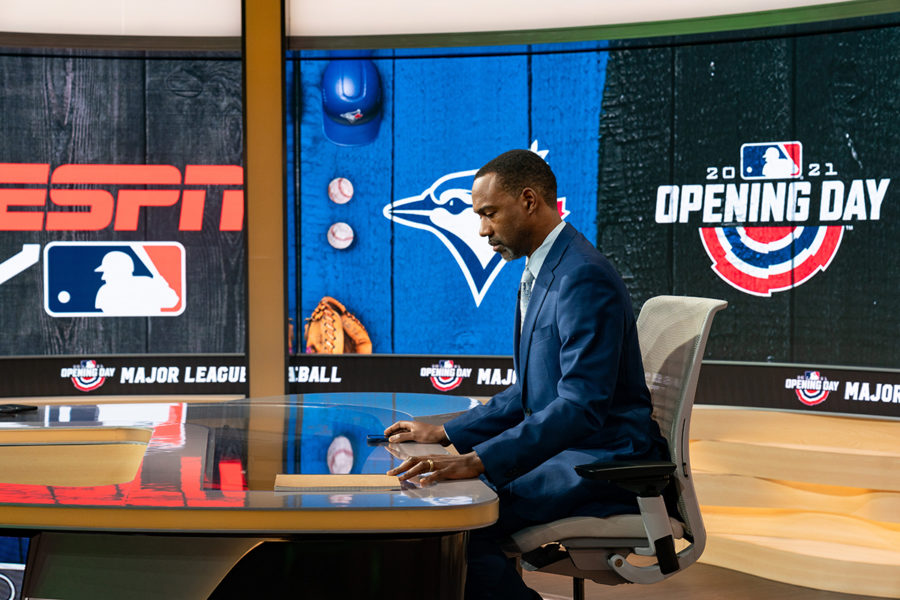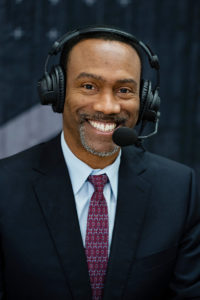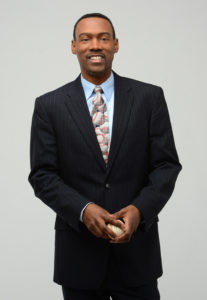
Bristol, CT - April 1, 2021 - Studio Y: Doug Glanville during MLB opening day on Campus. (Photo by Kelly Backus / ESPN Images)
The former Phillies star is currently hosting a TV show, contributing to several big-name publications, and giving speeches.
In life, he believes, we’re all on the same team.
As this article was written, MLB’s owners and players weren’t working together much to get an actual season started. It’s the kind of occasional event that deromanticizes baseball to fans, even if baseball probably shouldn’t be so romanticized.
To Doug Glanville, a player rep during his distinguished career, it’s nothing new.
“Knowing the history, it’s familiar. It’s not atypical to be on the threshold of missing games. That they had all these years without strikes, without lockouts, is pretty remarkable actually. Someone like Chase Utley had an entire career without work stoppages. That’s pretty incredible.
“But I also know historically it’s a contentious relationship. There’s no question you get to certain crossroads. The way I look at it is, at what point would owners test players who had never been on strike before? Is that a strategy, to see how much resolve you have when you start missing paychecks?”

Bristol, CT – April 13, 2021 – Remote Studio : Doug Glanville calling an MLB regular season games remotely.
(Photo by Kelly Backus / ESPN Images)
So, are the players being reasonable demanding a larger share of the ginormous profits they generate?
“I think of A Few Good Men,” Glanville observes. “You know, it doesn’t matter what I believe, it matters what I can prove. Even if you have reasonable objectives, you’ve got to figure out the balancing point, the space of equilibrium.
“The middle class was seemingly eroding; I think that was a reason for concern. Because when they were trying to bring people together, it’s easier to do that when you can say that each group of you, no matter where you are in your career, has seen growth.
“That’s the case you want to make, but when the young guy gets this or the old guy, you start to create a certain tension on who you’re taking care of the most.
“On our podcast the other day, I was asking, ‘What is it about veterans that they’re really pushing for rookies?’That’s very different. When I was coming up it was like, be seen, not heard, whatever, pay your dues.”
To Glanville, it might ultimately come down to who blinks.
“They don’t seem that far apart in theory. You’re not introducing dramatically new economic systems. It doesn’t seem anywhere close to insurmountable. But there’s always this in the back of my mind, ‘Will someone test the resolve of the other?’ And that’s usually where things go off the rails.”
Doug Glanville has learned, both from growing up in Teaneck, NJ and playing professional baseball, that coming together means everything.
Some time after his baseball career ended, Glanville faced two of the types of incidents that African Americans encounter in their lifetimes, whether they’re famous ex-athletes or not.
The first happened at his home in Hartford, as he was shoveling snow in his driveway. A police officer out of his jurisdiction pulled up and questioned him brusquely, supposedly acting on a report elsewhere. The situation, thanks partly to Glanville’s defusing mindset, didn’t escalate, but it bothered the former baseball star enough to act.
“There’s a law in Connecticut called the Glanville Law, it’s from my police experience in my driveway. From day one, it was hard, but I ended up realizing that I need to learn what the police experience. I spent over two months learning and talking to people, to understand as many perspectives as I could, before I even wrote the article in The Atlantic about it. By then I was informed, and then when I did the long game of 18 months of political engagement to get a law passed, I had so many other people that were with me.
“It wasn’t because I was some pied piper. I realized that when you approach things with a certain humility, that you don’t have all the answers, that there’s a perspective you may not have considered, and you’re patient, I found you create a much more elegant solution.”
About a year later, in Los Angeles of all places, another incident motivated Glanville to push for changes.
“I’m trying to get a cab at LAX with my colleague who was white,” he remembers. “The cab driver rolls down the window, sees my colleague and pops the trunk. I’m with him clearly, in my mind, clearly. I go back to put my luggage in the trunk. The guy says, ‘You take the bus, it’s $19.’ Refused to let me get into his car.”
It turned out Glanville wasn’t making some imaginary mountain out of that.
“The LAPD had a sting operation, with undercover African American officers that went in plain clothes, to see if there’s this major discriminatory problem at LAX. The first day they did it, 30% of the black riders, officers, got refused service. They ended up doing this sting, and getting information, and they changed the law, they changed the policy.”
Doug Glanville hosts a TV show, Class Is In Session With Doug Glanville. He has written a book called The Game From Where I Stand. He has contributed to The New York Times and The Athletic among others. He is a motivational speaker who discusses everything from baseball culture to parenting. In all these forums, his goal is the same: focusing on what unites us and using that to move forward.
“My hope is that you will realize that we are all walking in the same shoes in a lot of regards. It’s important if you ever want to accomplish something that’s sustainable, that you bring people with you and that you learn their perspectives.
“When I have these experiences that involve race or dynamics of identity, yeah, it was hard, but I saw the long game.
“In the end, that’s what sustains.”
No athlete who has played for a Philadelphia team needs to be told about putting your heart into what you do.
” I was one of those fans,” Glanville remembers. “I knew to play hard. Play with your heart, run hard, run every ball out.
“Chicago (where Glanville played as a Cub for two seasons) was different. I remember [pitcher] Frank Castillo was a teammate of mine, may he rest in peace. He started off a season like 0-9, and the fans are like, don’t worry, Frank, you’ll win your next one, you’ll be 1-9!
“Just warm, fuzzy and friendly. In Philly, people would stop me in the street, and talk about how I gotta tuck my shoulder in and I’m pulling off the ball.
“They’re gonna be hard on you. But when someone’s hard on you for not running out a ball, they should be. When you’re not appreciating the game, the opportunity, the chance to do what you do for a living, I think that’s totally fine. You may not hit the ball 500 feet, you may not throw 98 [mph], but you can run a ball out.”
As he reflects on running the ball out in baseball and in life, the soft-spoken Glanville is both proud of how his efforts helped make real changes, and grateful for his experiences during and after his baseball career. Not just the thrill of, say, meeting Hall & Oates, but also playing for the team he loved growing up.
My first autograph, I wrote a letter to Bob Boone. He wrote back, he signed a 4×6 photo card. My first trip to the Hall of Fame, I came back with a Mike Schmidt headshot that I bought.
He remembers well being traded to his favorite team. “It was a tough time because my grandfather had passed away 24 hours before. It was wonderful because I was traded to the Phillies, but I couldn’t embrace it completely because I was dealing with the loss.
“But once it actually happened, and I got to wear the Phillies uniform, that was beyond cool. I love how they keep legacy players connected. I got to see Mike Schmidt, Garry Maddox came to my wedding, Bowa was my manager. That’s a dream. I loved listening to Harry Kalas, I watched the Phanatic every game.
” I remember catching the first pitch from Steve Carlton, I was like, that’s the motion I imitated in Wiffle ball!”
With his show, speeches, and articles, Glanville devotes his time today to using his experiences to benefit all of us.
“I’ve always tried to explore the best virtues of sport. When you’re in an environment that is concerned about fairness, you have rules to abide by, [and] that’s a good example for a larger society. For the rules to be fair, and the game to be fair, [so] that you can compete.
“I think of that one aspect, and another is that there’s a sense of unity and teamwork that exists in sports like very few places. Maybe the military, but there are not a lot of places that allow you to see the importance of coming together for a common goal like sports.
“It’s nice to get 200 hits, but one of the biggest joys every day was being around people from different walks of life, and figuring out how to come together, how to accomplish something.
“We have a lot more in common than we don’t.”

Bristol, CT – January 7, 2014 – Photo Studio: Portrait of Doug Glanville.
(Photo by Joe Faraoni/ ESPN Images)

